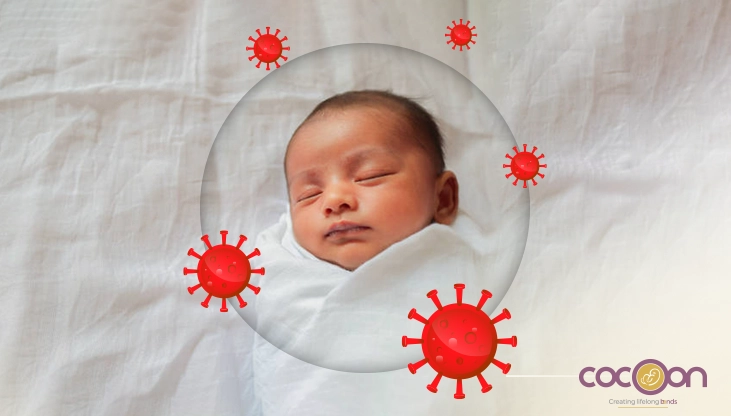Seasonal infections in newborns are quite common. This is because their immune systems are still developing and learning to fight off microorganisms, causing infection. Pediatric experts say there is no single reason; rather, multiple factors, such as underdeveloped immunity, incomplete vaccinations, crowded places, and shifting seasonal weather, all contribute to infection.
While getting sick occasionally is a normal process of building their immunity, frequent or severe infections can hinder routines, affect growth, and undoubtedly worry parents. Thankfully, simple, timely precautions recommended by doctors can make a big difference in lowering how often these infections occur and how serious they become.
List of Seasonal Infections in Newborns
Here is the list of infections that can infect a newborn according to the seasons:
A. Winter Season
- Viral infections like bronchiolitis or other respiratory issues
- Infections of the middle ear
- Eczema (dry skin)
B. Monsoon Season
- Water-borne gastrointestinal issues (stomach flu) and skin infections
- Dengue and chikungunya are due to mosquitoes
C. Summer Season
- Heat rash
- Loose motion and vomiting due to dehydration
D. Spring & Autumn (Transitional Season)
- Seasonal allergies due to pollen grains
E. Mild Weather-related Infection
- Common cold-like symptoms include a runny nose, congestion, and a mild cough.
Severe weather-related Infection
- PIV-1, PIV-2 (causing laryngitis, inflammation of the voice box), and PIV-3 (causing bronchiolitis and pneumonia),
- Neonatal sepsis caused by group B streptococci, Escherichia coli, and Listeria monocytogenes
Note: In both cases, whether mild or severe, you need to follow the doctor’s advice, especially if you are a new parent.
How Can I Prevent Seasonal Infections in My Infant?
Here are the preventive methods to reduce the chances of potential infection in newborns.
1. Follow Good Hand Hygiene
Before touching your baby, make sure to wash your hands completely. This reduces the transmission of viruses and bacteria from your hands to the infant's delicate skin and nasal passages.
2. Maintain a Distance From Sick People
Keep your baby away from individuals having colds, flu, or other infections. Newborns have weak and underdeveloped immune systems that are unable to fight off infections well.
3. Breastfeed Timely
Breast milk is composed of antibodies and immune cells that help protect the baby from infections. Hence, breastfeeding extensively to support their baby's immune system naturally and decrease the chances of seasonal respiratory and gut infections.
4. Prepare a Clean & Hygienic Environment
Regular cleaning and sterilization or disinfection of the baby's toys, bottles, and surfaces they touch stops germs from building up. This helps you to keep infection away from your infant.
5. Refrain From Going to Crowded Places
Avoid going to crowded or confined places, especially during cold and flu seasons, when viruses spread easily. This lowers the risk of your infant catching seasonal infections.
6. Go for Timely Scheduled Vaccinations
Visit your pediatrician for the scheduled vaccination, including flu shots for pregnant women and caregivers. Vaccines are crucial because they help prepare the baby’s immune system to fight specific infections in the present and years to come.
7. Give Good Nutrition & Maintain Hydration
Provide doctors' prescribed age-appropriate nutrition and keep your baby hydrated. This supports proper growth and development and functioning of their immune system.
8. Dress Your Baby As Per the Weather Outside
Keep your infant comfortably warm, but do not overheat during cold seasons. The aim is to protect them from temperature stress, which can weaken immunity.
What are the Multiple Reasons Behind Frequent Infections in Infants
There can be multiple reasons behind the infection; some of them are:
- Developing or immature immune system.
- Exposure to pathogens from individuals around them.
- Poor hygiene or environmental factors (such as cigarette smoke and pollution).
- Health issues or genetic problems weaken the immune system
- Inadequate sleep and nutrition.
When to Consult Your Doctor
You need to consult a reliable doctor, like at Cocoon Hospital, in the following situation:
- Persistent high fever
- Trouble breathing
- Refuses to feed
- Decreased number of wet diapers
- Severe or persistent cough, vomiting, diarrhea
- Lethargic or harder to wake-up
Note: Every child is different and can show various symptoms. Do not ignore any unusual signs, even if they seem harmless, and contact your doctor immediately for the precise diagnosis and treatment.
Conclusion
Maternal antibodies provide essential early protection to newborns, particularly during the first six months of life, by helping them to fight off infections. Unfortunately, this protection slowly decreases as the baby’s own immune system matures. While it can be difficult to protect your child from every infection, the good news is that following preventive measures and seeking timely medical care can keep your baby safe and healthy.

















